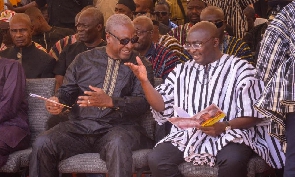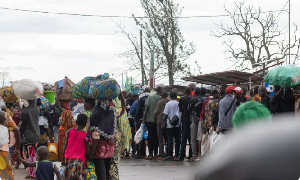Ghanian musicians are missing out on thousands of dollars of royalties that have collected for the use of their works in other countries.
This is because, the Copyright Society of Ghana COSGA has not been able to reciprocate the gesture by paying royalties to musicians from other countries whose works are used in Ghana.
Some collecting agencies have over the years written to COSGA saying they have collected some money on behalf of Ghanaian musicians but want to know what COSGA has also done for their musicians. Because COSGA is handicapped in that direction the dollars have been held up.
Mr J. A. Larkai, Acting Executive Director of COSGA agrees that the amount being witheld could be lots of money. He told Showbiz last Tuesday, “If you look at the craze for highlife music, especially as they are played on radio, among the huge Ghanaian communities in foreign countries, the royalties accruing could be huge.
“In these countries, users can’t play music without logging them but because we are handicapped here, we do not have the moral right to ask for our money. So they get to keep the money”.
He said COSGA has an agreement with agencies like GEMA of Germany, PRS of the United Kingdom, SAMRO of South Africa among others.
“As members of International Confederation of Society of Authors (SISAC), we are supposed to exchange information on our members. Every author is to be given a code which captures his/her work when performed internationally but because of our perculiar problem here, we find it difficult to exchange works.
He said COSGA is not confident in pushing in that direction because of the state of affairs in the country.
“ The legal environment is non existent here. It isn’t that COSGA doesn’t know what to do but we do not have the fundamental legal framework to give effect to the implementation to exchange of works and transfer of monies across nations.
“We have no money for other countries so we do not request for ours. We have isolated ourselves. The thing to do is to send returns and collect what belongs to us but we are not doing that.
“We are still waiting for the provision in the 2005 Copyright Act which will strengthen the hand of COSGA. We hope this pending Legislative Instrument (LI) which makes it an offence to play music and not submit returns comes into force.”
He said under the SISAC law, when royalties collected on behalf of an author are not requested for after a period of three years, the money is used for cultural purposes in that particular country which collected the royalties.
According to Mr Larkai, the key problem apart from the non submission of returns is the relationship between COSGA and users.
“Users challenge us when we raise tariffs. How can a hotel in Ghana pay ¢25,000 for a whole year? The operational legal framework doesn’t exist so COSGA’s hands are tied. An issue like this can be resolved if we have a Copyright Tribunal. This tribunal assists in resolving tariff troubles. Although the law exists, there is the need for a LI to creat a tribunal. Most of the countries who have been successful with royalty collections have them.
On the issue that COSGA is dragging its feet for the LI to come into force because such a law will prevent them from dipping their hands into royalties collected, he said,”On the contrary even before the law was passed, the COSGA Board sponsored the drafting of all the requisite LI and placed it before the Attorney Genral Department. We are anxious to bring it out to strengthen our hands.
Touching on mechanical rights, Mr Larkai said it has not succeeded here because musicians do not want to tie their fortunes with the success of their works.
“It is going to be difficult to operate it in Ghana because most of our musicians do not have the patience to wait. The selling of their rights in advance to producers has gone too deep. Some sell their rights for as low as ¢20m and then the work becomes a hit and the producers reap the benefits and they lose out.
“ COSGA can only advise. We do a precedece for them for free. If they have the patience to wait, they could reap benefits from their works for the rest of their life time as well as 70 years after their death.
Meanwhile COSGA is currently paying royalties for the first half of the year. According to Mr Larkai this allocation is about ¢1.3b which in fact accounts for just about 10 per cent of royalties that should be collected.
“Look at the number of drinking bars and chop bars at every corner of the country. Not forgetting the number of radio and TV stations, banks and other users all over the country. As at now, less than 10 per cent of users pay royalties. So the coming into force of the LI will go a long way to strengthen COSGA which will transcend into more revenue for the musicians.”












